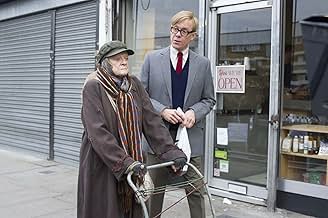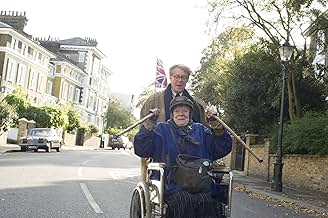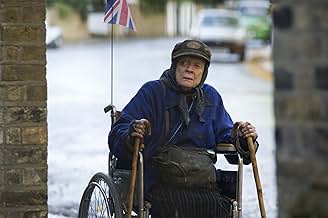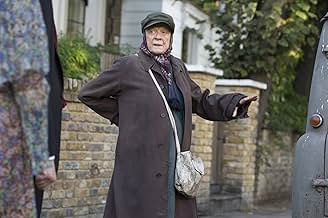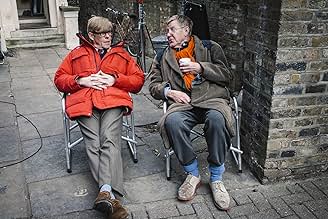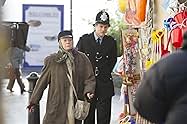AVALIAÇÃO DA IMDb
6,7/10
34 mil
SUA AVALIAÇÃO
Um homem forma um vínculo inesperado com uma mulher que mora em uma van.Um homem forma um vínculo inesperado com uma mulher que mora em uma van.Um homem forma um vínculo inesperado com uma mulher que mora em uma van.
- Indicado para 1 prêmio BAFTA
- 1 vitória e 8 indicações no total
Avaliações em destaque
"The Lady in the Van"
I added this movie to my watch-list months ago, as soon as I saw the premise and Maggie's name in it's description. Just watched it. And it's EXACTLY what I expected it to be. :)
The plot: (without spoilers)
It's a poignant portrayal of a homeless woman who finds shelter when a lonely writer out of his timidness (don't confuse it with politeness, although being England, timid is good, too) lets her park her van in his driveway. Their bond, which was supposed to end within a few months, lasts almost 15 years.
The review: (without spoilers)
From the starting, you'll be hooked to the character of Maggie Smith, thanks to her glorious acting and the delightful character, Mary/Margaret/Miss Sheperd, she brings life to. Alex Jennings, who plays Alan, the man who lets her stay in her driveway, is quite a delightful actor himself. I don't think I've seen him in any other flicks. Yet.
Regardless to say, the acting is superb. The plot is adorable and heartbreaking, both at the same time. It's a perfect little drama movie with loads of charming humor, mainly delivered by Maggie. Yes, it gets a bit, as the other reviewers have put it, "dull" in the second half, but I think it's perfectly fine, because going in halfway, I expected nothing else. By the time it ended, there was a sense of contentedness in my heart. Also, it had stopped raining, not that THAT matters! :P
In short, this movie is a perfect, "bundle of joy".
I give it: 7.5/10
Also, I have noticed most of the British flicks go unnoticed, here on IMDb. I really wonder why. I have been tracking this one here for months and still it has only 10K or so votes and a lower rating than it deserves. Anyway, I hope this review will attract more viewers? I don't know, but one CAN hope.
That's it for now folks! :)
I added this movie to my watch-list months ago, as soon as I saw the premise and Maggie's name in it's description. Just watched it. And it's EXACTLY what I expected it to be. :)
The plot: (without spoilers)
It's a poignant portrayal of a homeless woman who finds shelter when a lonely writer out of his timidness (don't confuse it with politeness, although being England, timid is good, too) lets her park her van in his driveway. Their bond, which was supposed to end within a few months, lasts almost 15 years.
The review: (without spoilers)
From the starting, you'll be hooked to the character of Maggie Smith, thanks to her glorious acting and the delightful character, Mary/Margaret/Miss Sheperd, she brings life to. Alex Jennings, who plays Alan, the man who lets her stay in her driveway, is quite a delightful actor himself. I don't think I've seen him in any other flicks. Yet.
Regardless to say, the acting is superb. The plot is adorable and heartbreaking, both at the same time. It's a perfect little drama movie with loads of charming humor, mainly delivered by Maggie. Yes, it gets a bit, as the other reviewers have put it, "dull" in the second half, but I think it's perfectly fine, because going in halfway, I expected nothing else. By the time it ended, there was a sense of contentedness in my heart. Also, it had stopped raining, not that THAT matters! :P
In short, this movie is a perfect, "bundle of joy".
I give it: 7.5/10
Also, I have noticed most of the British flicks go unnoticed, here on IMDb. I really wonder why. I have been tracking this one here for months and still it has only 10K or so votes and a lower rating than it deserves. Anyway, I hope this review will attract more viewers? I don't know, but one CAN hope.
That's it for now folks! :)
The film begins with our protagonist Miss Shepherd (Smith) driving through the English countryside hoping to avoid a policeman. There is blood splattered against her cracked windshield and a flustered look on Shepherd's face. We then meet our narrator Alan Bennett (Jennings) a playwright who has just moved to the quiet middle-class neighborhood of Camden. He is of two minds; one who writes fastidiously while the other takes care of the daily functions of his life. The doppelgangers argue about the trajectory of his work, both deciding he lacks the excitement of Hemingway and the complexities of Proust. Then Miss Shepherd moves into the neighborhood, setting her dilapidated van along the street to the horror of Camden's well-to-do residents.
Dame Maggie Smith has had a long and illustrious career to be sure. A consistently tremendous force on the stage and screen, Smith has been in show-business since the 1950's and not once has she faltered with an abysmal performance. The Lady in the Van is certainly no exception. She takes on the role she first popularized on the stage play with gusto relishing in the tiniest little moments that breathe life into Shepherd. So popular was her portrayal on stage that she was nominated for Best Actress at the Olivier Awards and this year she was similarly nominated for a Golden Globe.
Alas The Lady in the Van is not simply about Shepherd and her cantankerous run-ins with neighbors, social workers and Alan. Alan's struggle to come to terms with his sickly mother, his circumspect sexuality and his writing, at one point putting on a monologue on London's West End which goes badly. Alex Jennings tries hard to make his duel role stick but his periodic subplots feel airy, lack conflict and pad time in between Smith's charming homeless-woman stunts and his own droll voice-over narration. He's not a real character or at least one we really care about. He's simply the vessel in which the story carries itself while Smith is the showcase.
While it's easy to see how this film's source material is stage- driven, director Nicholas Hytner does a fine job elevating the story in a more cinematic way. He used his eye to similar aplomb in The Madness of King George (1994) which delved into similar themes albeit in a much grander way. We get a picturesque view of springtime Camden with all the trappings of upper-middle class opulence. In such an environment, Shepherds garish van sticks out like a sore thumb jabbing at the neighbors sensibilities. Despite the main conflict surrounding what the neighborhood should to with their local reprobate, none of them are treated as outright monsters. The film takes place within a 15-year time span thus what eventually becomes a nuisance morphs into a local mainstay.
There's one piece of The Lady in the Van puzzle that must be addressed and that is the outstanding score by five time Oscar nominee George Fenton. His original music is grand and bittersweet which perfectly matches the emotional core of the film. He borrows some insightful leitmotifs from Shostakovich and Tchaikovsky while also presenting some specific pieces by Schubert and Chopin. One particular piece; an impromptu by Schubert does such a good job portraying the sadness and sense of guilt of Miss Shepherd, that it ranks up there with the Chopin ballad scene in The Pianist (2002) as best example of classical music translating character emotion.
Yet in spite of some stellar music, one showstopping performance on the part of Maggie Smith and a kindly message about transience, The Lady in the Van can't help but feel almost too sweet. It's a movie that will put a warm smile on your face and keep it there but it won't stick with you long after you've left the theater. That's not altogether a bad thing though; if you're craving for some wholesome entertainment sure to warm your heart, The Lady in the Van is certainly worth your time.
Dame Maggie Smith has had a long and illustrious career to be sure. A consistently tremendous force on the stage and screen, Smith has been in show-business since the 1950's and not once has she faltered with an abysmal performance. The Lady in the Van is certainly no exception. She takes on the role she first popularized on the stage play with gusto relishing in the tiniest little moments that breathe life into Shepherd. So popular was her portrayal on stage that she was nominated for Best Actress at the Olivier Awards and this year she was similarly nominated for a Golden Globe.
Alas The Lady in the Van is not simply about Shepherd and her cantankerous run-ins with neighbors, social workers and Alan. Alan's struggle to come to terms with his sickly mother, his circumspect sexuality and his writing, at one point putting on a monologue on London's West End which goes badly. Alex Jennings tries hard to make his duel role stick but his periodic subplots feel airy, lack conflict and pad time in between Smith's charming homeless-woman stunts and his own droll voice-over narration. He's not a real character or at least one we really care about. He's simply the vessel in which the story carries itself while Smith is the showcase.
While it's easy to see how this film's source material is stage- driven, director Nicholas Hytner does a fine job elevating the story in a more cinematic way. He used his eye to similar aplomb in The Madness of King George (1994) which delved into similar themes albeit in a much grander way. We get a picturesque view of springtime Camden with all the trappings of upper-middle class opulence. In such an environment, Shepherds garish van sticks out like a sore thumb jabbing at the neighbors sensibilities. Despite the main conflict surrounding what the neighborhood should to with their local reprobate, none of them are treated as outright monsters. The film takes place within a 15-year time span thus what eventually becomes a nuisance morphs into a local mainstay.
There's one piece of The Lady in the Van puzzle that must be addressed and that is the outstanding score by five time Oscar nominee George Fenton. His original music is grand and bittersweet which perfectly matches the emotional core of the film. He borrows some insightful leitmotifs from Shostakovich and Tchaikovsky while also presenting some specific pieces by Schubert and Chopin. One particular piece; an impromptu by Schubert does such a good job portraying the sadness and sense of guilt of Miss Shepherd, that it ranks up there with the Chopin ballad scene in The Pianist (2002) as best example of classical music translating character emotion.
Yet in spite of some stellar music, one showstopping performance on the part of Maggie Smith and a kindly message about transience, The Lady in the Van can't help but feel almost too sweet. It's a movie that will put a warm smile on your face and keep it there but it won't stick with you long after you've left the theater. That's not altogether a bad thing though; if you're craving for some wholesome entertainment sure to warm your heart, The Lady in the Van is certainly worth your time.
Maggie Smith never disappoints. She is such an amazing actress and continues to be in "The Lady in the Van." Such an interesting true story of a very odd woman, this film is very endearing. The chemistry between Maggie Smith and Alex Jennings is very enjoyable to watch. Their relationship had a sort of codependency between them that was really fueled by a real caring for each other for different reasons. Director Nicholas Hytner did a great job of portraying the comedy found in this story. And that is due to the great acting of Maggie Smith, whom I cannot say enough about. Her recent Golden Globe nomination for Best Actress in a Motion Picture- Comedy was well deserved and although she didn't take home the trophy, her performance is still one to be heavily applauded.
"Lady in the Van" from 2015 is the "mostly" true story of playwright Alan Bennett's relationship with a woman who lived in various vans parked in his driveway for fifteen years. Bennett here is played by Alex Jennings, and the lady, Miss Shepherd, Maggie Smith.
Miss Shepherd, who smells awful from not bathing, lives in a crowded van and moves it from place to place, staying until she's thrown out or until she hears music. When she's told to move or do something else, she yells, as only Maggie Smith can do, "I'm a sick woman! Dying possibly!" Alan finds it impossible to break from her, though he tries. She prays very fervently and one time tells him that she spoke to the Virgin Mary at the post office. When he asks if the van is insured, she says she doesn't need it, she's insured in heaven. "So what happens if you have an accident?" Alan asks. "Who pays? The Pope?"
Alan is gay, though his friends are always trying to fix him up with a woman. One day Miss Shepherd says, "All those people who come and go in the dark, I know who they are." "Oh, Jesus," he says under his breath. "They're Communists!" she hisses. "Otherwise they wouldn't come and go in the dark."
Miss Shepherd is a woman of mystery - Alan finally learns that she studied piano, speaks fluent French, and was a nun. She also at times is seen going to someone's house in the dead of night. A man opens the door and comes outside. And someone stops by her van from time to time, and she gives him money.
In the end, we learn who these people are, her story of the convent, the history of her piano-playing, why she prays all the time, and who the men are.
Alex Jennings is perfect as Bennett (who appears at the end of the movie). He has his voice down pat, and in the film, there are two Alans - the writer Alan and the observer Alan, who talk with one another throughout the film. It's Alan who lives in the real world who encourages the writer Alan to be helpful to Miss Shepherd.
I am so privileged to have seen Maggie Smith in "Lettice and Lovage," one of my greatest evenings in the theater, where I laughed until I cried. At the end of that play, she gets on the phone and does a serious, touching monologue. She does the same here. Instead of the crazy homeless lady with the plastic bags we see and laugh at and wonder about during the play, she does a monologue that tells us who she is, and about her pain, heartbreak, and disappointments. "Why did you choose to be homeless?" Alan asks. "I didn't choose," she insists. "It was chosen for me."
A wonderful film about an uptight, cold man and a disturbed religious bag lady - you won't soon forget it.
Miss Shepherd, who smells awful from not bathing, lives in a crowded van and moves it from place to place, staying until she's thrown out or until she hears music. When she's told to move or do something else, she yells, as only Maggie Smith can do, "I'm a sick woman! Dying possibly!" Alan finds it impossible to break from her, though he tries. She prays very fervently and one time tells him that she spoke to the Virgin Mary at the post office. When he asks if the van is insured, she says she doesn't need it, she's insured in heaven. "So what happens if you have an accident?" Alan asks. "Who pays? The Pope?"
Alan is gay, though his friends are always trying to fix him up with a woman. One day Miss Shepherd says, "All those people who come and go in the dark, I know who they are." "Oh, Jesus," he says under his breath. "They're Communists!" she hisses. "Otherwise they wouldn't come and go in the dark."
Miss Shepherd is a woman of mystery - Alan finally learns that she studied piano, speaks fluent French, and was a nun. She also at times is seen going to someone's house in the dead of night. A man opens the door and comes outside. And someone stops by her van from time to time, and she gives him money.
In the end, we learn who these people are, her story of the convent, the history of her piano-playing, why she prays all the time, and who the men are.
Alex Jennings is perfect as Bennett (who appears at the end of the movie). He has his voice down pat, and in the film, there are two Alans - the writer Alan and the observer Alan, who talk with one another throughout the film. It's Alan who lives in the real world who encourages the writer Alan to be helpful to Miss Shepherd.
I am so privileged to have seen Maggie Smith in "Lettice and Lovage," one of my greatest evenings in the theater, where I laughed until I cried. At the end of that play, she gets on the phone and does a serious, touching monologue. She does the same here. Instead of the crazy homeless lady with the plastic bags we see and laugh at and wonder about during the play, she does a monologue that tells us who she is, and about her pain, heartbreak, and disappointments. "Why did you choose to be homeless?" Alan asks. "I didn't choose," she insists. "It was chosen for me."
A wonderful film about an uptight, cold man and a disturbed religious bag lady - you won't soon forget it.
A very entertaining, and occasionally touching, film written by Alan Bennett, a British National Treasure - though I'm sure he must be irritated, if not sickened, by being so described. His unique voice is instantly recognisable: self-knowing, self-mocking, never ever self-regarding. In spite of a string of stage and screen successes, he is essentially a man of letters: there is a literary quality about his work, and a good deal of his humour emerges from the contrast between the elegance of his sentences and the earthy, realistic observations they contain.
Bennett adapted his memoir about Miss Shepherd, whose residence is the eponymous vehicle (one of a series of vehicles, as it turns out) that occupies his driveway for fifteen years, for the stage, which brought director Nicholas Hytner and actors Maggie Smith and Alex Jennings on to the project. All three return for this film version, and an excellent job they make of it.
Bennett slyly juggles a number of subplots without you ever really being aware that is what they are. When they are finally identified and tied up in a package, it feels a little too neat and tidy after all that sprawl - an interesting comparison is Charlie Kaufmann's bleaker vision of a writer's struggle with a piece of work, Synechdoche New York - but Bennett's droll dialogue, and his clear-sightedness over the way compassion intertwines with guilt, compensates for the sense of well-made screenplay that dominates the closing section of the film.
Highly recommended.
Bennett adapted his memoir about Miss Shepherd, whose residence is the eponymous vehicle (one of a series of vehicles, as it turns out) that occupies his driveway for fifteen years, for the stage, which brought director Nicholas Hytner and actors Maggie Smith and Alex Jennings on to the project. All three return for this film version, and an excellent job they make of it.
Bennett slyly juggles a number of subplots without you ever really being aware that is what they are. When they are finally identified and tied up in a package, it feels a little too neat and tidy after all that sprawl - an interesting comparison is Charlie Kaufmann's bleaker vision of a writer's struggle with a piece of work, Synechdoche New York - but Bennett's droll dialogue, and his clear-sightedness over the way compassion intertwines with guilt, compensates for the sense of well-made screenplay that dominates the closing section of the film.
Highly recommended.
Você sabia?
- CuriosidadesThis movie was shot in the actual house on the street where the events took place, Gloucester Crescent in Camden Town. Some of the same people still lived there when the star prop arrived, decades later.
- Erros de gravaçãoMargaret/Mary is shown parking her new Commer van in the drive of Alan Bennett's house and she pulls up on the handbrake in the middle of the van, where a handbrake would normally be. In fact Commer vans had their handbrake to the right of the driver's seat between the seat and the door - not between the two front seats.
- Citações
Rufus: Sorry, you can't park here.
Miss Shepherd: No, I've had guidance. This is where it should go.
Rufus: Guidance? Who from?
Miss Shepherd: The Virgin Mary. I spoke to her yesterday. She was outside the post office.
Rufus: What does she know about parking?
- Cenas durante ou pós-créditosDuring the first part of the credits, a young Margaret can be seen playing the piano at her concert in King's Hall.
- ConexõesFeatured in Alan Bennett at 80: Bennett Meets Hytner (2014)
- Trilhas sonorasPiano Concerto No. 1 In E Minor, OP. 11
Written by Frédéric Chopin
Performed by Clare Hammond and BBC Concert Orchestra
Orchestra Leader Charles Mutter
[The principal piano piece that recurs throughout the film is Chopin's Piano Concerto 1, using both the slow middle (second) movement "romanza" and the quick final (third) movement "rondo". Alfred Cortot was especially associated with playing Chopin's piano oeuvre.]
Principais escolhas
Faça login para avaliar e ver a lista de recomendações personalizadas
- How long is The Lady in the Van?Fornecido pela Alexa
Detalhes
- Data de lançamento
- Países de origem
- Central de atendimento oficial
- Idiomas
- Também conhecido como
- The Lady in the Van
- Locações de filme
- 23 Gloucester Crescent, London, Greater London, Inglaterra, Reino Unido(Alan Bennett's house where the events actually occurred)
- Empresas de produção
- Consulte mais créditos da empresa na IMDbPro
Bilheteria
- Orçamento
- US$ 6.000.000 (estimativa)
- Faturamento bruto nos EUA e Canadá
- US$ 10.021.175
- Faturamento bruto mundial
- US$ 41.387.687
- Tempo de duração1 hora 44 minutos
- Cor
- Mixagem de som
- Proporção
- 1.85 : 1
Contribua para esta página
Sugerir uma alteração ou adicionar conteúdo ausente







